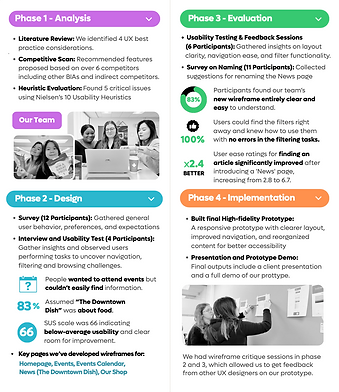.jpg)
UX Improvement for Downtown Kingston Website
1
OVERVIEW
Course: Team Project
Client: Downtown Kingston BIA
Semester: Winter 2025
Team Members:
Thao Ly Nguyen
Le Thao Quynh Nguyen
Amaka Nwadiei
Sara Liwiniuk
The Downtown Kingston Business Improvement Area (BIA) wanted to improve its consumer-facing website to better support tourism, community engagement, and local commerce. Our UX Design team was tasked with evaluating the current site, identifying pain points, and designing an improved user experience that would reflect the vibrancy of the downtown community.
2
PROCESS
The Downtown Kingston Business Improvement Area (BIA) wanted to improve its consumer-facing website to better support tourism, community engagement, and local commerce. Our UX Design team was tasked with evaluating the current site, identifying pain points, and designing an improved user experience that would reflect the vibrancy of the downtown community.
Research Phase
We began by identifying the core usability challenges on the existing site. I contributed in a heuristic evaluation using Nielsen’s 10 Usability Heuristics, which revealed multiple pain points such as unclear navigation, inconsistent labels, and limited feedback on user actions. To validate these findings with real users, we created a survey attract key audiences (students, local residents, and tourists) to explore their goals and frustrations.


Our team - Consumer Site Group
We then conducted a first round of usability testing and interview on the current website, focusing on tasks like finding event information, browsing local businesses, and discovering articles. The insights we gathered helped us identify major pain points around content discoverability, filter functionality, and naming conventions.


Downtown Dish page
Events pages
Usability Testing & Feedback Sessions
Once the prototypes were ready, I wrote script and facilitated a second round of usability testing focused on evaluating our redesigned wireframes. We tested 6 participants using task-based scenarios, measuring how easily they could find events, use filters, shopping items, and navigate articles.
Alongside usability tests, we also ran feedback sessions to gather open-ended impressions about the clarity of the design, content and visual hierarchy. We asked participants to reflect on what felt intuitive, what was confusing, and what might help improve the experience further.
Analysis and Synthesis
After testing, I created the analysis of both qualitative and quantitative data. We synthesized the feedback into key themes: overall improvement in clarity and ease of use, strong preference for search bar, and improving events calendar filtering. I visualized our findings into presentation-ready data points.
This research-driven feedback loop helped validate our design direction and informed our final recommendations to the client.


High-fidelity Wireframe
3
CONCLUSION
Project Outcome
The redesigned Downtown Kingston BIA website showed strong improvements across usability and user satisfaction. Our second round of testing revealed that users found the experience much more intuitive and efficient. For instance, 83% of participants said the new homepage was clear and easy to navigate, and 100% confirmed that the redesigned event calendar layout made sense to them.
Participants also responded positively to the improved structure of content throughout the site. They appreciated being able to explore events using multiple view formats (card, list, and calendar). Overall, the feedback pointed to a cleaner, more user-centered experience that helped visitors achieve their goals with less friction.
Click to see full of our Results Overview
This project allowed me to grow in both UX research and design execution. As someone who enjoys both writing and visual problem-solving, I was able to take on responsibilities across multiple phases of the project. In the early stages, I contributed in the heuristic evaluation and helped design the research plan, interviews, and usability tests. Later, I co-developed the wireframes and prototypes, applying our research findings to create designs that truly responded to user needs.
I am proud of my ability to move between research synthesis and visual design, bringing clarity to feedback and translating it into thoughtful design decisions. Facilitating both usability testing and feedback sessions helped me strengthen my communication and analysis skills, particularly when drawing out meaningful insights from participant input.
Finally, this project reinforced my passion for user-centered design and showed me how impactful a collaborative, iterative approach can be. It also confirmed my strength in balancing the detail-oriented mindset of a UX researcher with the creative thinking of a graphic designer.

Downtown Kingston's homepage
Problem Statement
The existing website lacked clarity, mobile responsiveness, and intuitive navigation, making it difficult for users, especially students, locals, and tourists, to discover events, browsing articles, explore local businesses, and engage with content.
Project Goals
-
Make the website more user-friendly and visually appealing
-
Improve access to event information and local businesses
-
Organize content clearly and ensure mobile-first usability
-
Ensure the site supports both purposeful visits (e.g., event search, read articles, find what shops are available) and exploratory browsing
Target Audience
-
Students & Young Locals: Often seek cafés, events, festivals, and quick updates on what’s happening downtown
-
Residents: Regularly attend community events such as local markets, family-friendly events and support small businesses
-
Tourists: Want to discover attractions, restaurants, and events with ease during short visits
